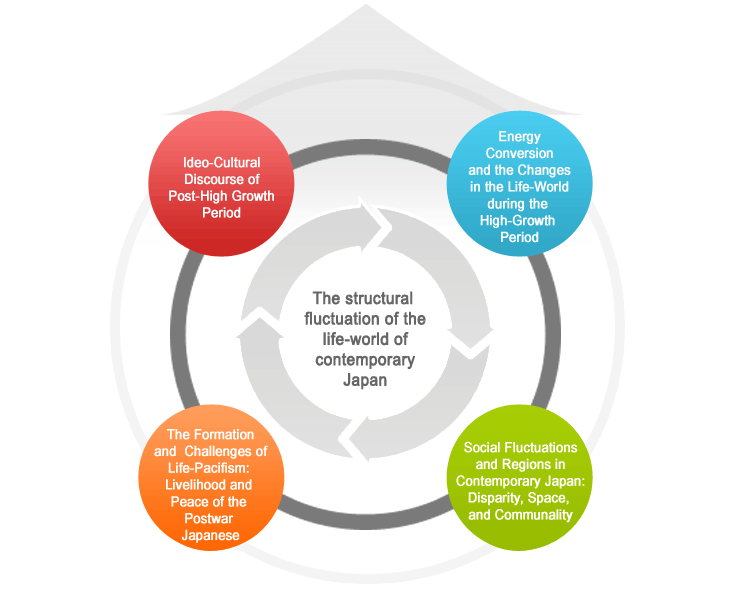
| Team | Ideology and Discourse |
|---|---|
| Abstract | Under the topic of ‘Changing Postwar Japanese Ideology and Cultural Discourse,’ this research studies the structural change from the high growth period in the 60s to 80s, until the post-economic growth period. This is an extension of the first stage HK Research Project’s ‘Postwar Japan’s Knowledge Formation,’ and ‘Contemporary Japan’s Traditional Culture and Art.’ Emphasis is on the perspective and relation among culture•community policies, and social•class•gender, humanities and social science discourse, and mass culture. We plan to investigate Japanese internal and external social change and as well as the changes in the international society and track down the social changes in the Japanese society and how that affects Korea and other East Asian countries. |
| Director | JO, Gwanja (HK Prof. at SNU IJS) |
| Assistant Administrator | LEE, Kyung-boon (HK Research Prof. at SNU IJS) |
| Research Participants |
PARK, Kyu-tae (Prof. at Hanyang Univ., Depart. of Japanese Language and Literature) PARK, Jung-jin (Assistant Prof. at Tsuajuku Univ., International Relations) PARK, Jeehwan (HK Prof. at SNU IJS) JANG, In-Sung (Prof. at SNU Depart. of Political Science and International Relations) NAM, Sang-wook (Researcher at SungKunKwan Univ.) |
| Research Assistant | CHOI, Ho-young (SNU Depart. of Korean Language and Literature, Ph.D.) |
| Team | History and Economics |
|---|---|
| Abstract | This research studies the transitional period from postwar revival to high-growth period and the social, perceptional changes that accompany the transition. After the war, Japanese economy experienced rapid revival and economic growth that enabled Japan to be global economic power and the mass consumer society enlarged immensely. However, as can be seen in poor residential environment, Japanese mass consumer society is differentiated by that of the United State. Japanese Life-World becomes an excellent source in understanding such difference, especially by looking at the process of how prewar lifestyle developed during the revival and high-growth period and the social-economic limitations of the development. Furthermore, such social-economic transitions accompany psychological conflicts. Thus, we must understand the economic, literature, historical perspective of the Japanese materialistic world and how these changes transform the Japanese life-world. |
| Director | LIM, Chai-sung (HK Prof. at SNU IJS) |
| Assistant Administrator | LEE, Eun-gyong (HK Research Prof. at SNU IJS) |
| Research Participants |
SEO, Dong Ju (HK Research Prof. at SNU IJS) YEO, Inman (Prof. at Kangneung-Wonju National Univ., International Commerce) JIN, Pil-su (HK Research Prof. at SNU IJS) KIM, Eun-Hae (Visiting Researcher at SNU IJS) LIM, Eun-Jeong (Visiting Assistant Prof. at Johns Hopkins Univ., Graduate School of Int’l Relations) |
| Research Assistant | JANG, Il-Soo (SNU Depart. of Economics, Ph.D.) |
| Team | Society and Culture |
|---|---|
| Abstract | The purpose of this research is to explore the reconstruction at a community level after the 1990s. The recent Japanese society is going through unstable employment of young generation, aging and low birthrate demographic change, entry of minority groups, and other re-configuration of communities. These problems are part of the changing macro-social construction and at the same time, the dynamics of the life-world. The research approaches the problem of Japanese society’s reconstruction in the 1990s with two keywords—‘social inequality’ and ‘communality.’ The growing social gap is not purely an earning gap, but it extends to isolating the disadvantaged. This planned research tries to analyze the problems above from a macro-economic perspective and finds empirical studies in the community-society. Through this study, we will be able to understand the everyday life of the Japanese after the 1990s and find similar phenomenon in the Korean society that embeds similar social problems. |
| Director | PARK, Jeehwan (HK Prof. at SNU IJS) |
| Assistant Administrator | CHO, Ahra (HK Research Prof. at SNU IJS) |
| Research Participants |
KIM, Young (Prof. at Busan Univ., Depart. of Sociology) HAN Young Hae (Prof. at SNU GSIS) PARK, Kyung-min (Researcher at SNU Center for Cross-Cultural Studies) CHOI, Min-kyeong (Research Trainee at SNU IJS) LEE, Soon-nam (SNU GSIS, Ph.D.) |
| Research Assistant | TAMURA, Fuminori (SNU Depart. of Geography, M.A.) |
| Team | Politics and Diplomacy |
|---|---|
| Abstract | This study tracks the postwar Japanese pacifist movement that started from the revolutionary elites and politicians’ anti-war-anti-nuclear moement into anti-base-anti-nuclear plant residential movement. The research will find the reality and front-line of ‘life-pacifism. Furthermore, we will explore the possibility of the establishment of anti-nuclear discourse and the possibility of institutionalization after 3.11. At the end, we will look into domestic politics and international relations from the perspective of Japanese life-world formation and change and seek for a new research field. So far, we have held numerous seminars and held discussions under the texts below: (1) 「Origin of Japan’s Postwar Pacifism: Meaning of Postwar and Descendent Limits」(Ki-jeong Nam, 2008), (2) 『Modern Japan’s Pacifism』(Tabta Shinobu, 1997), (3) 『Occupation and Peace』(Michiba Chianobu, 2005). |
| Director | NAM, Ki-jeong (HK Prof. at SNU IJS) |
| Assistant Administrator | JIN, Pil-su (HK Research Prof. at SNU IJS) |
| Research Participants |
PARK, Ih-Jin (Research Trainee at SNU IJS) PARK, Jin Woo (Prof. at Sookmyung Univ., Japanese Studies) SEO, Dong Ju (HK Research Prof. at SNU IJS) LEE, Kyung-boon (HK Research Prof. at SNU IJS) LEE, Eun-gyong (HK Research Prof. at SNU IJS) PARK, Jung-jin (Assistant Prof. at Tsuda Univ., International Relations) |
| Research Assistant | SHIMOKAWA, Ayana (SNU Political Science and International Relations M.A.) |